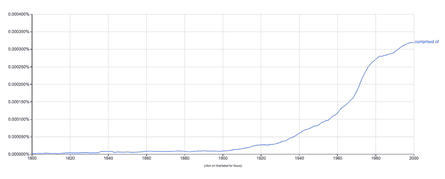We all have our grammatical bugbears. If you’re anything like me, they’ll irritate you, but you’ll let them go. No one wants to be the smart-arse constantly reminding people that it should be “fewer” and not “less”. But for software engineer Bryan Henderson, that kind of defeatism just doesn’t cut it. Every Sunday night, before he goes to bed, he tracks down and expunges the 70-80 new instances of “comprised of” that have appeared on Wikipedia in the past 7 days, according to Medium. He is a super-pedant.
Henderson is open about his one-man war on the construction. In a bitesize 6,000-word essay, which I’ve boiled down to its essentials, he sets out what’s wrong with it.
Many people do not accept ‘comprised of’ as a valid English phrase for any meaning. The argument goes that ‘to comprise’ means to include, as in ‘the 9th district comprises all of Centerville and parts of Easton and Weston.’ And thus, ‘the 9th district is comprised of ...’ is gibberish. The phrase apparently originated as a confusion of “to comprise” and “to be composed of”.
That’s not quite what the Oxford English Dictionary says. But Henderson is adamant, giving us six reasons to ditch “comprised of” and dropping some linguistic clangers in the process.
It’s completely unnecessary. There are many other ways to say what the writer means by “comprised of”. It adds nothing to the language.
That’s a bizarre argument and one that could be made against all synonyms or near-synonyms. Should we ditch the word “accurate” because we have the word “truthful”? And who is Henderson to decide that it adds nothing?
It’s illogical for a word to mean two opposite things.
If you want logic, speak Vulcan. English contains various words that mean their own opposite. They’ve been called auto-antonyms and include verbs like “cleave” (to join together or to separate) and “dust” (to add dust – think crops – or to remove dust – think feather duster).
The etymology of the word does not support “comprised of”. It comes from Latin words meaning to hold or grasp together. Other English words based on those same roots are “comprehensive” and “prehensile” (as in a monkey’s prehensile tail: it can grab things). Comprise’s French cousin also makes this clear.
Etymological fallacy klaxon! A word’s origin isn’t a guide to its “authentic” meaning. If it were, a “sycophant” would be a person who liked to show figs.
It’s new. Many current Wikipedia readers learned to write at a time when no respectable dictionary endorsed “comprised of” in any way. It was barely ever used before 1970. Even now, style manuals frequently call out this particular usage as something not to do.

It’s not new, as this 19th century example shows. But it has been gathering pace. So what? Since when has “newness” meant something is incorrect?
It’s imprecise. English has a variety of ways to say things the writer means by “comprised of”. “Composed of”, “consists of”, and “comprises” are subtly different. In sentences I edit, it often takes careful thought to decide just which one of these things the article should say. Thus the sentence with “comprised of” isn’t quite as expressive.
Precision is useful. But ambiguity is inherent in natural language. That’s part of the reason it’s been more difficult than people thought to get computers to process human language.
Many writers use this phrase to aggrandize a sentence – to intentionally make it longer and more sophisticated. In these, a simple “of”, “is”, or “have” often produces an easier-to-read sentence. (Example: “a team comprised of scientists” versus “a team of scientists”).
Fine: but this is a matter of taste, and I’d take issue with Henderson deciding that what he happens to like should be the norm on Wikipedia.
In my experience, the problem with super-pedants is that they believe their preferences are somehow objectively right. But there is no absolute measure of correctness in language. You can see that in the fact that today’s repeated error often becomes tomorrow’s standard usage. That’s not to say that we can’t make aesthetic judgments – I know I do. But they’re based on my own feelings.
If super-pedants were to admit to themselves that it’s just a question of individual taste, they’d probably leave the rest of us alone.








